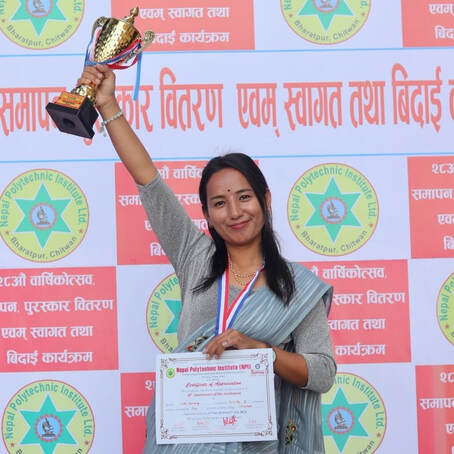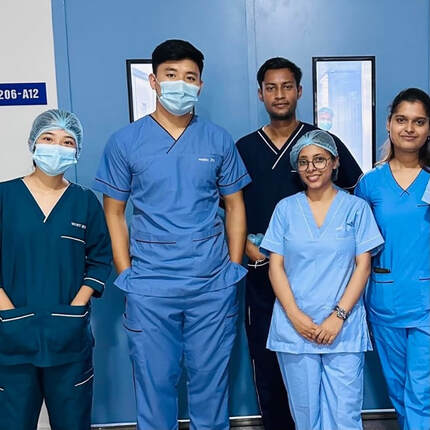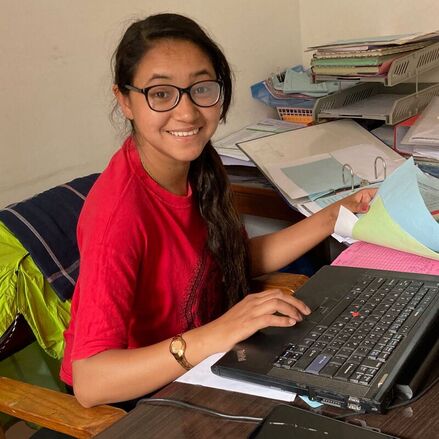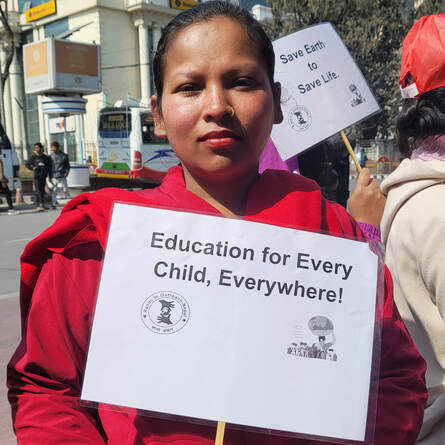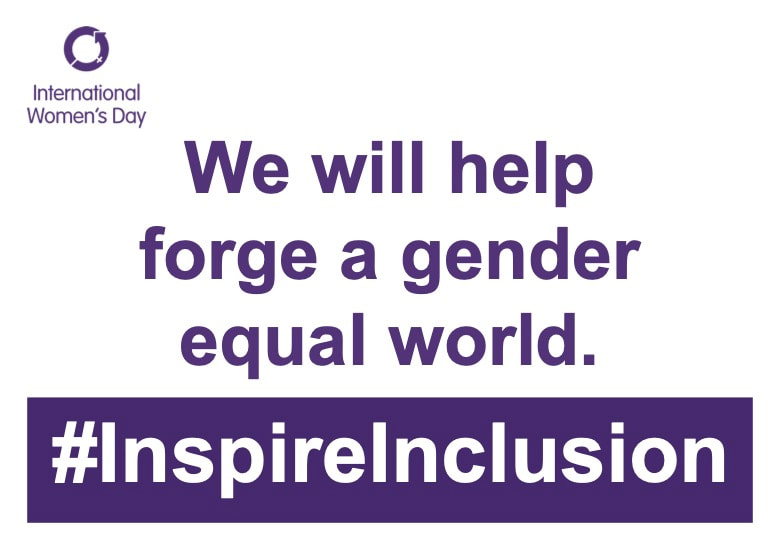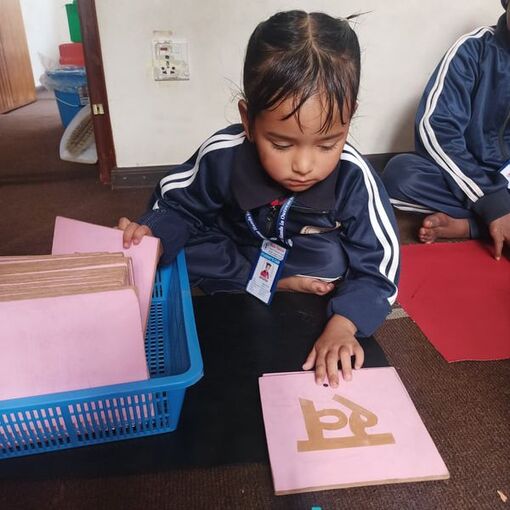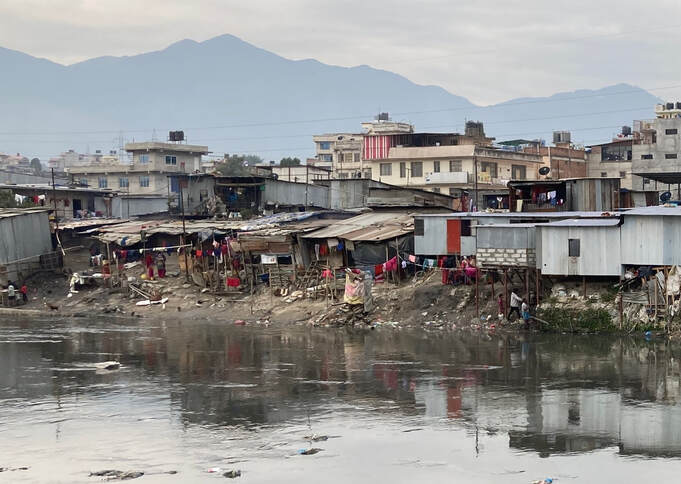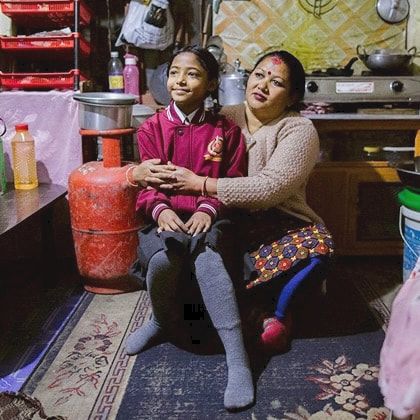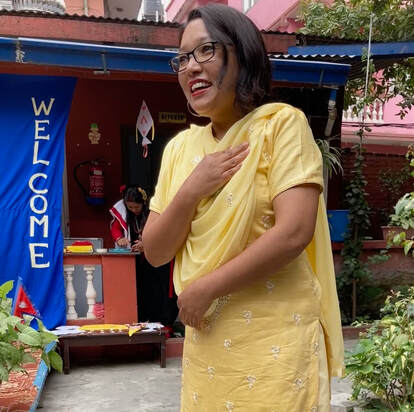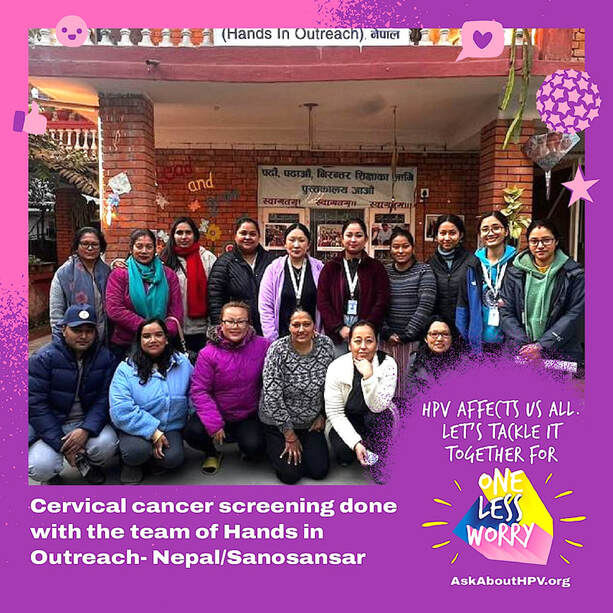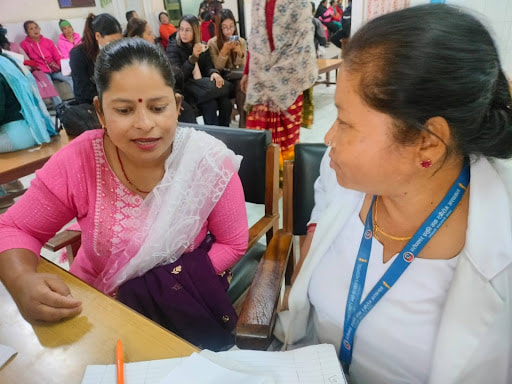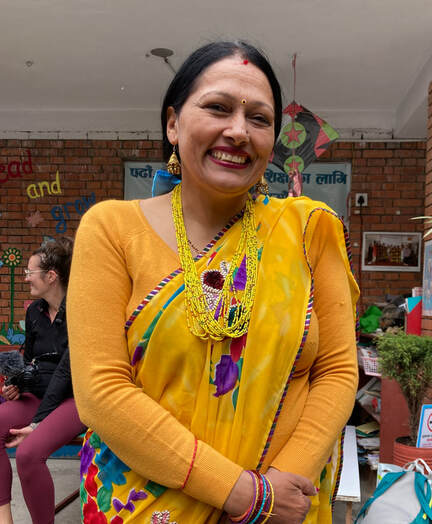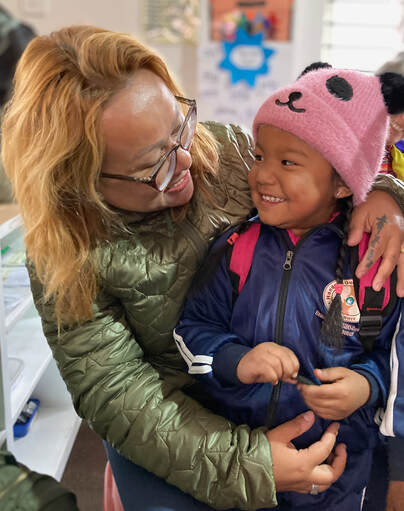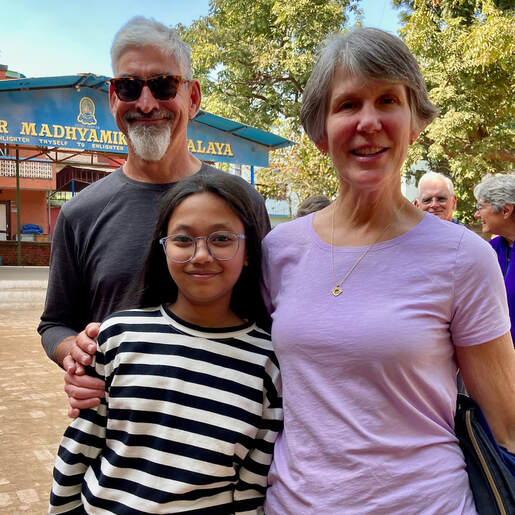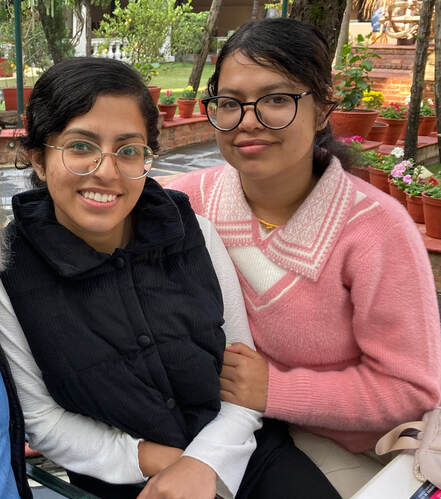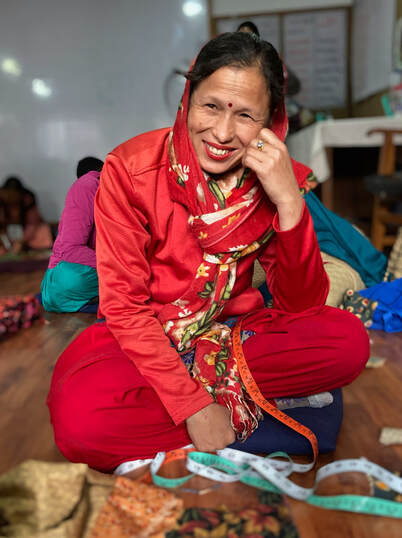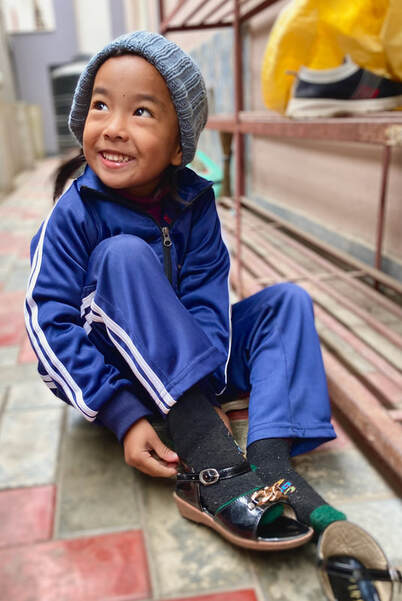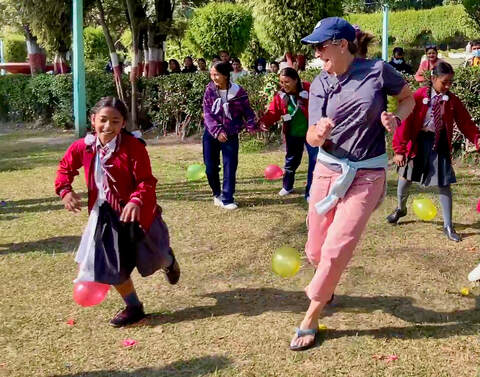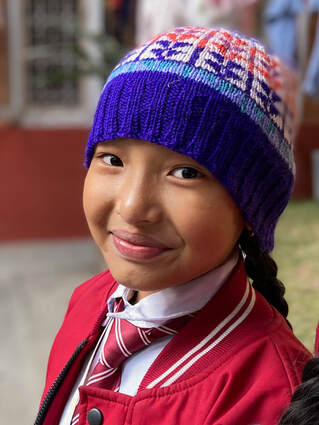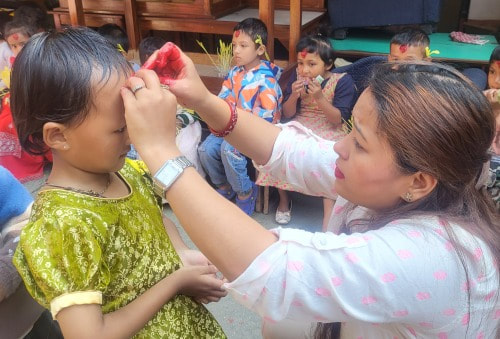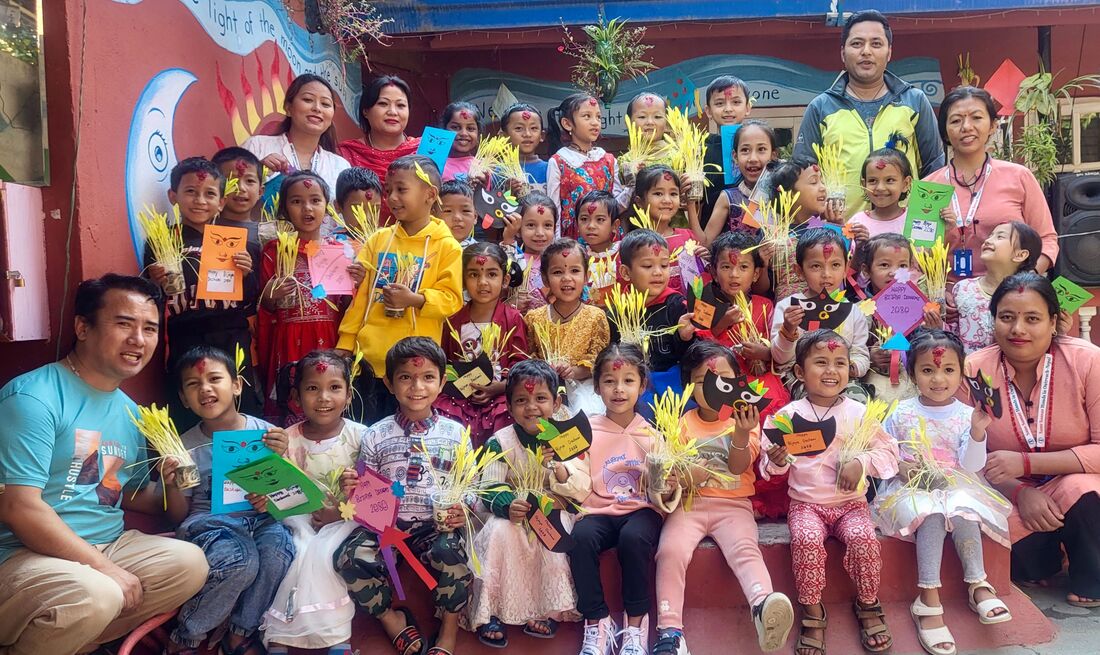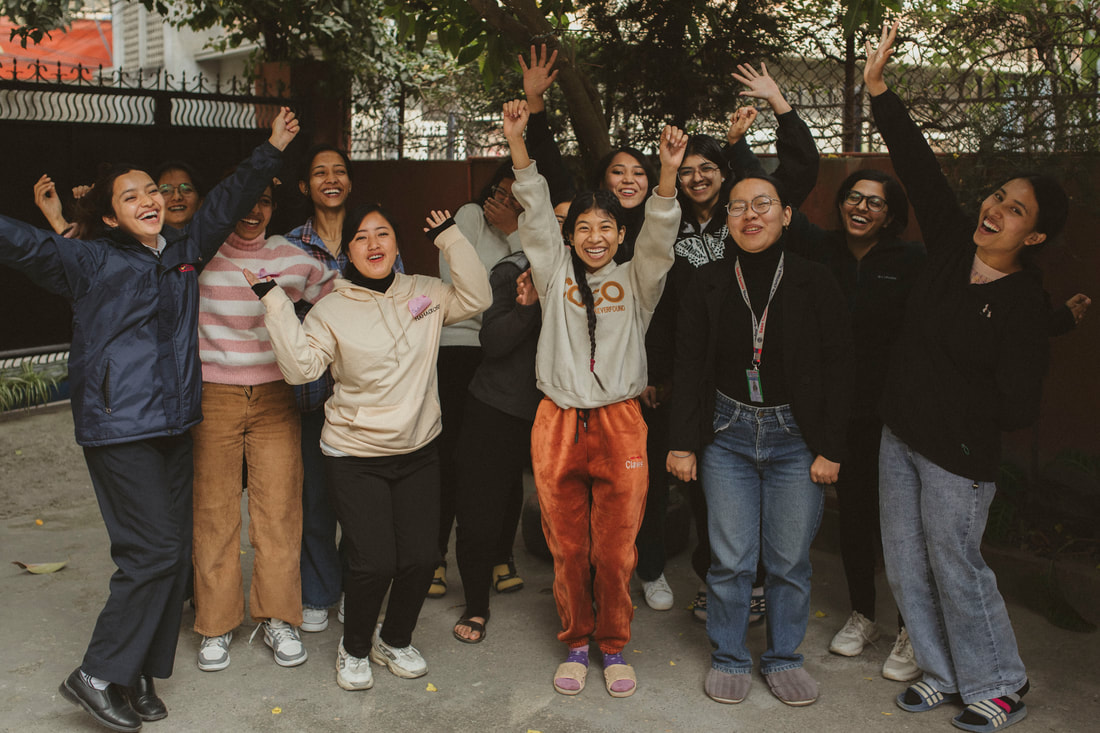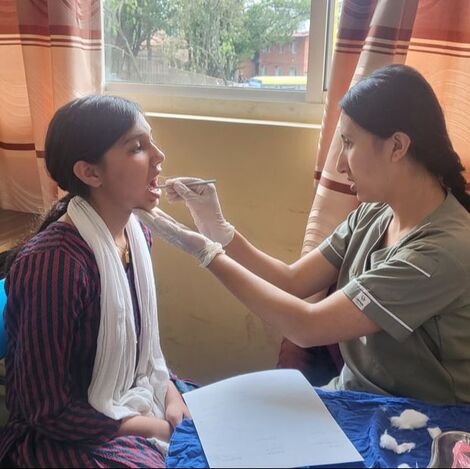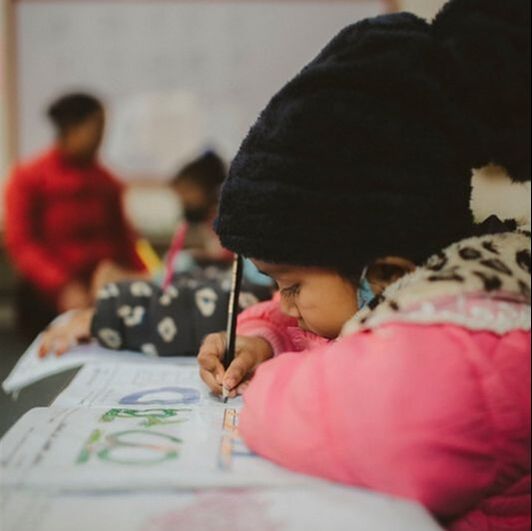|
Nischita recently began first grade as an HIO sponsored girl. Her mother, Chitra, is working toward a high school diploma, sponsored through HIO’s Be Part of Her Dream program. Both are so grateful for this opportunity to change their lives. Dear Friends, We're seeking support for courageous mothers working toward self-determination in our Be Part of Her Dream (BPOHD) women’s empowerment program. Most of our sponsored girls’ mothers have little formal education, making it nearly impossible to earn decent wages or provide safe, healthy living conditions for their families. They live in cramped rented rooms, working as domestics, construction workers or doing piece work for pennies. BPOHD helps these marginalized women develop confidence and practical skills to change this narrative. Since 1985, HIO has been empowering girls in Nepal through access to education. We have a long history of educating mothers and female caregivers as part of our overall strategy for alleviating poverty. Our programs fully embrace two generations, providing both sponsored girls and their mothers the basic right to attend school— the fundamental benefit of education these mothers were denied as young girls. Your contribution to BPOHD helps bring HIO’s educational intervention full circle, giving daughters and mothers the opportunities they need to lift their families from deep-rooted poverty. A $500 gift will support the education of a woman like Rina for one year. Denied a chance to go to school as a girl, Rina recently completed a productive year in our BPOHD program with nearly perfect attendance. Rina is so proud to be part of a sisterhood of women like herself who are learning to read and write in English and Nepali, developing financial literacy skills and gaining understanding of their human rights. Rina’s daughter, Priya, is a wonderful inspiration. Now a first-year college student in HIO’s Reach for the Stars program, Priya has been sponsored by the Orsagh family since first grade. In an effort to give back to the organization that’s helped shape her life, Priya serves as an afterschool tutor for younger HIO girls and helps her mother and other women complete their BPOHD homework. Your investment in women’s education is helping achieve the systemic change we hope to see. We’re humbled by your heartfelt, caring support. The power that BPOHD nurtures within our girls’ mothers — their inner drive, resilience, intelligence and grit — has immense capacity to encourage a generational shift toward gender equality in Nepal. A goal every bit worth working toward as we celebrate this Mother's Day.
With deep gratitude and warm wishes - Laura and Ricky
0 Comments
Dear Friends, Carolyn Schmitz is a very special person with an enormously kind heart. She’s led numerous trips to Nepal, introducing dozens of people to a landscape and culture she treasures. Carolyn’s love for the HIO community has inspired many people in her circle to become HIO sponsors themselves. After tirelessly serving at different times on the HIO board for about fifteen years, Carolyn is stepping down this month to devote more time to her dear mother Elsa, also an HIO sponsor in her early 90’s, and her new granddaughter, Row. We’re so grateful for the personable, creative, generous, positive and brave energy Carolyn has brought to HIO’s work over the years. In 2009, Carolyn’s life intersected with young Jyoti Kapali’s when she became Jyoti’s HIO sponsor. The loving connection Carolyn and Jyoti have nurtured from half a world away is truly remarkable. Jyoti was raised in a small neighborhood in Kathmandu close to the fetid Vishnumati River. Her father passed away when she was a young child, leaving Jyoti and her younger siblings in the care of their mother, Thuli Maya, and their aunties, Tara and Kanti. We respectfully referred to the adult care-givers as the Kapali women. From Carolyn’s 2010 journal... After homework we walked Jyoti home. When she reached out for my hand crossing the dusty, garbage lined street, I almost started crying. This warm little girl so quickly opened her heart to me, a complete stranger. Amidst the noise of construction and traffic, we climbed over piles of debris leading to her one room living quarters, home to Jyoti’s two aunties, her mother and younger sister and brother. Her aunties greeted us with smiles and a snack. No furniture was in the room except for an old Singer treadle machine. Blankets were rolled up and stacked in the corner, to pull out for bedding. We sat on the floor, as Ram interpreted our conversation. It was easy to get a sense of how little money this family survived on. I couldn’t help comparing the vast differences of our worlds. It’s a very strange feeling when one contemplates the fate we're all born into. My experience with Jyoti and her family will forever continue to remind me of how fortunate I am. Jyoti had the unusual benefit of growing up with three strong women acting as role models and mothers. Hard-working and diligent care-givers, all three Kapali women, though illiterate, fiercely valued pursuing the dreams an education could provide. Sadly, Thuli Maya passed away from cancer just a few years back. Carolyn’s role as an additional mother figure and friend became ever more vitally important to Jyoti at this time. Jyoti is an equally astonishing young woman, with a wealth of potential to succeed in so many profound ways. She recently completed her first year studying economics at the Asian College for Women (AUW) in Bangladesh, having never before stepped foot outside her small neighborhood in Kathmandu. Jyoti’s full scholarship to AUW is a spectacular achievement. Most of the credit, of course, goes to Jyoti for being such a dedicated student. But it probably would not have happened had Carolyn not mentioned the thought of AUW to HIO’s co-director Laura Hunt. How proud Jyoti’s mother, Thuli Maya, would have been to live these precious moments in Jyoti’s life as she reaches for her dreams and embraces new opportunities. Together, Carolyn and Laura did the research and hatched a plan. Jyoti, though quite frightened at the prospect of leaving home for the first time, put her trust in her mentors and agreed to embrace the difficult application process. When the acceptance letter came some months later, the two remaining Kapali women were also frightened about Jyoti leaving their home. Ultimately, they gave their blessing to Jyoti, and encouraged her to pursue her education at AUW. Amazing! We can’t thank Carolyn enough for her selfless commitment to our HIO community. She will forever be a face of HIO. How wonderful that she will also forever be a mother figure who Jyoti can count on to share her joys, challenges and successes in years to come. Carolyn Schmitz is such a beautiful inspiration for us all. With deep gratitude - Ricky and Laura Carolyn continues to travel to Nepal, visiting as many sponsored girls as she can. Her warm, caring spirit helps each of our girls feel truly special.
Dear Friends, On this International Women’s Day, the world is being called to inspire inclusion. For our marginalized, low income girls and young women in Nepal, this call could not be more meaningful. In Nepal’s patriarchal society, girls are too often unwanted. Daughters are expected to give up their education and bury their dreams. Educating boys takes preference because parents look to their sons to support them in old age. Uma earned a degree in veterinary studies and is now studying for a BS in agriculture techniques. She was proud to help lead her women’s basketball and volleyball teams to first place wins in her school’s annual sports day. Coming of age seems to happen in a heartbeat for our sponsored girls. Navigating the difficult pathways to adulthood is a constant challenge. Wedding rituals are highly romanticized in Nepali culture. Daughters are routinely encouraged to leave school, marry by the time they’re fifteen, and have children soon after, as most of their mothers did. Little consideration is given to the dangerous outcomes these practices present for girls. Unfortunate choices during adolescence can easily end a girl’s chances of lifting herself from the relentless grip of her poverty. According to UN Women, when girls are educated, we see faster poverty reduction. Educated girls marry later and their children are healthier. Fewer die in childbirth. Educated women’s daughters have a greater chance of becoming educated themselves. Each additional year a girl spends in school can boost her earnings as an adult by up to 20%. Educated women contribute more significantly to their local economies. They’re more community-minded and politically active. Pooja, with glasses and cap, is finishing her third year of medical school in Nepal. She’s grateful to Jack and Beth Isler for sponsoring her education. Pooja is inspired to study hard by her mother, Laxmi’s, grit, Jack’s 40-year career as an eye surgeon and her own experience managing a benign tumor behind her right eye. Pooja aspires to become an eye surgeon, serving the people of Nepal. Our aim is to turn the narrative around. To instill in our girls and their mothers a sense of self-determination, stability and voice. To encourage our girls to stay in school through high school and beyond. The immense potential of creating systemic change toward gender equality by educating girls is profound. Thanks to your unwavering support, our strategy is working. HIO graduates are changing the world. Nyima’s a respected physician in Kathmandu who’s now conducting TB screenings. She and Sanju, a banker, are valued HIO Nepal board members and Mamata's the Social Service Director. Manisha's the lead teacher at our Chandra Kala Learning Center. Reshma and Kabita are dentists, Bimala, Reena and Sonam are nurses, Sabita’s a microbiologist and Rabita’s a med-tech specialist in a Nepali hospital. Kanchan’s an engineer and Sarah’s a lawyer. Sukreema and Renuka have excellent jobs working in a medical data collection office and are considering going back to college to earn master degrees. Binita was lovingly sponsored by Vivienne Verdon-Roe from age six through college. She studied hard, determined to use her education to change her family’s life. Binita now works full time as HIO-Nepal’s Finance Manager. These accomplished women serve as mentors and role models for their HIO sisters now in college. Sashmita and Sachina are in dental school, with Sashmita providing regular dental screenings for our girls and their mothers. Sujata and Apsara are in law school. Jyoti and Binita attend the Asian University for Women in Bangladesh. Sarala, Pabita and Smriti are in nursing school. Pooja and Ikshya are in medical school. Menuka, not college bound, will soon join a fashion design course. Priya’s studying hotel management. Susmita, Neera, Heena, Asmita, Deepa and Sabina are working towards business degrees, and Shreejana and Samjana, now working as valued staff members for HIO Nepal, are also enrolled in social work courses. The list goes on. We’re so proud of all that our HIO girl are accomplishing. Through hard work, determination, networking and grit, they’re achieving the unimaginable. Through access to education and inclusion in systems that inspire economic empowerment, they’re leading the way for a growing sisterhood of HIO graduates to reach for the stars. We couldn’t do this outstanding work without your generous support. With deep gratitude — Ricky and Laura Tara, mother of three HIO-sponsored girls, was among eight women in HIO’s Be Part of Her Dream women’s empowerment program who attended the World Social Forum in Kathmandu to learn about and promote human rights.
Dear Friends, What’s one thing we can do to help children living in poverty gain a fighting chance to lead more fulfilling lives? The World Bank tells us to invest in their early education. Good news! That’s exactly what HIO is doing. With your kind support, nearly one hundred young girls and boys receive free early education at HIO’s Chandra Kala and Sanepa learning centers. They and their families are deeply grateful for the doors our learning centers open. The curriculum at HIO’s learning centers is Montessori-based, helping young children gain academic skills while building confidence and self-reliance. Nestled onto quiet side streets, our two learning centers are hidden gems amidst dusty, horn-honking commercial areas in Kathmandu’s inner-city. They’re abuzz with a broad range of purposeful educational activities from early morning to evening. One center is used for women’s empowerment classes before young children bounce in for a full day of preschool. Both centers provide vital afterschool programming for sponsored girls in grades 1-9. Counseling services for older girls making college and career decisions are made available. HIO’s learning centers are hubs for our wraparound social services as well. Our Nepal team lovingly prepares healthy meals and snacks in the centers’ kitchens for all HIO programs. Community members gather at both centers for food distributions and health camps. HIO families living on the edge appreciate the sense of stability, connection and support they find at Chandra Kala and Sanepa. The centers’ nurturing, family-like environments make them feel like second homes. Beacons of hope that encourage young minds, bodies and spirits to thrive. Many girls now enrolled in HIO’s educational sponsorship program developed their first friendships and thirst for knowledge in our learning centers’ preschool programs. Administrators at our partner schools remark about how well-prepared our preschool graduates are for formal education. How their early learning experiences help them defy the conditions of poverty in which they live. HIO’s Sanepa Learning Center serves fifty profoundly poor girls and boys living in makeshift homes along the banks of the fetid Bagmati River. One second grader, Naina, embodies all that our learning centers aim to accomplish. Naina began attending preschool classes at our Chandra Kala center when she first moved to Kathmandu with her mother, Nani, in search of a better life. Naina was recognized by her preschool teachers as being exceptionally bright and hard-working. Two years ago, she enrolled in our partner school, Saraswati, as a first grader. Naina quickly established herself as an outstanding student there as well, consistently earning marks of distinction. She’s been ranked first in her class of 65 students for two years running. Naina is well-respected by her HIO sisters for being friendly, helpful and smart. She’s a shining source of pride for her preschool teachers and Nani alike. Like many HIO families, Nani is a single mother, the head of her household, working long, back-breaking days as a domestic. She and Naina live in one rented room with no running water and scant light. Nani barely earns enough for rent, food and household expenses. She believes in the power of education. Having been denied access to school as a young girl, Nani enrolled in HIO’s Be Part of Her Dream women’s empowerment classes at Chandra Kala last June. She’s being taught by Naina’s teachers. Like daughter, like mother, Nani is now excelling in her classes too. Naina takes responsibility for doing household chores and ironing her own school uniform so Nani may focus on her studies. They enjoy reading and writing together at night. Through education, both mother and daughter are well on their way to shifting their life’s story. Sponsored by Brian Cohoon, Naina gained a firm foundation for learning at our Chandra Kala center. Her mother, Nani, attends women’s empowerment classes there, her second chance for an education. Our Nepal team is at the heart of every small miracle our learning centers can accomplish. Through your kind generosity, we’ve employed eleven Nepali teachers and support staff at our learning centers since the devastating 2015 earthquakes. Most of our staff are women. Chandra Kala’s lead teacher, Manisha, was once an HIO sponsored girl herself. Although teaching young children is typically a low-paying, undervalued job with high turnover in Nepal, ten of our eleven original learning center staff still work with us today. We offer them competitive salaries, good benefits and opportunities to grow, hoping they’ll recognize themselves as the professionals we consider them to be. Each success our Nepal team helps make happen is a wonderful success story for us all. The access to education you make possible is truly transforming lives. We’re ever appreciative of your steadfast support. With deep gratitude - Laura and Ricky Chanda Shrestha, our Nepal Education Manager, helps create warm, welcoming learning environments that encourage all HIO students to shine.
January is Cervical Cancer Awareness Month around the globe. Our HIO Nepal team is actively meeting this challenge. Dear Friends, Did you know that cervical cancer is the leading cause of cancer-related deaths for women in Nepal? According to the World Health Organization, it’s the fourth most common type of cancer worldwide. Sadly, more than 90% of cervical cancer cases occur in marginalized developing countries. A lack of awareness and screening programs, as well as the high cost of the vaccine for poor people, lead to this alarming global inequity. HIO was first inspired two years ago to become part of a global movement to eliminate cervical cancer. At the time, we were helping an HIO girl’s mother living in a remote mountain village manage follow-up care after precancerous cells were detected in a cervical screening. Dr. Josh Jaffe, our trusted OB-GYN consultant in the Berkshires, provided us with excellent advice for her case. He told us that almost all cervical cancers are caused by the common human papillomavirus (HPV). Unlike other forms of cancer, it is completely preventable through vaccination. The HPV vaccine, approved for U.S. distribution in 2006, has shown an almost 90% reduction in cervical cancer in girls and young women who have received it. Cervical cancer is easily treatable when detected early. Raising awareness about the causes and risks of cervical cancer helps our HIO community be part of the solution. Working toward the successful outcome of this woman’s case prompted us to want to do more. We knew that applying HIO’s unique, grass-roots approach to social work could help alleviate this global health problem, starting with our own community. Dr. Jaffe generously serves as the lead advisor for HIO’s cervical cancer prevention initiative. We aim to raise awareness about the disease, administer the HPV vaccine to 200 HIO girls and young women up to age 24, and conduct HPV DNA screenings for their mothers and our HIO staff members, ages 25-60. With many thanks to the Comeau Family for funding the project, our Nepal social service team is moving forward with these big plans. Last week, they brilliantly coordinated the first round of HPV DNA screenings with our new healthcare partner, the Nepal Fertility Care Center (NFCC). Offering the screening at our Chandra Kala Learning Center’s family-like environment helped each participant feel more at ease with this sensitive process. After an orientation and awareness session conducted by NFCC’s healthcare professionals, 81 women were given personalized instructions for collecting a sample for analysis. Our Nepal team is coordinating with another new healthcare partner, EkEk Paila, for follow-up care for women who are determined to be HPV positive. In addition to offering low-cost medical and dental services to our entire HIO community, EkEk Paila is organizing our HPV vaccine clinic. A simple 2-dose HPV vaccine regimen, the key to preventing cervical cancer, will be given to girls age 9-14. Those who are age 14-26 will receive the recommended three doses. We are grateful to now have EkEk Paila and NFCC as valued resources and as inspiration for our young HIO women interested in healthcare. Access to education is the most effective way to encourage marginalized girls and their mothers to find a realistic path from abject poverty to a life with a measure of financial well-being and stability. Each success for one of our girls or mothers is a hard won struggle and a team effort. With a chorus of wellness interventions structured by HIO, our girls and their mothers are far more able to cope with an array of illnesses that commonly befall the poor. When a poor mother gets sick or dies, her family sinks deeper into hardship, perpetuating a cycle of poverty our educational interventions aim to break. Promoting the overall health and well-being of our HIO community is a number one priority of our social service program. Through our Nepal team’s initiative and your caring support, we’re making wonderful gains. Your kindness is encouraging improved health and self-reliance for our girls and their mothers. Together, we’re saving lives. We couldn't do this great work without you. With deep gratitude — Ricky, Laura and the HIO Nepal team Conditions of poverty severely limit HIO families’ access to preventive healthcare, causing them to suffer in silence. Our Program Manager, Sushila Chaurel, is a superb social worker whose networking skills encourage our mothers to receive health services that are their basic human right.
Mamata Rai, an HIO graduate and our Director of Social Services in Nepal, is an inspiration for the next generation of HIO girls. Dear Friends, We’ve been told by so many that the HIO community is a bright light in a world that’s increasingly filled with darkness. We couldn’t agree more. Our girls and their mothers have no choice but to rise to the challenges of living in profound poverty in a culture dominated by men. The joyful glimmers of hope for a better future they hold onto are ignited by the kindness of people like you. We have so much to celebrate together. Our trip to Kathmandu with a group of dedicated sponsors was a perfect capstone to a year filled with success stories. Our Nepal team, led by Mamata and Ram, is doing a remarkable job implementing HIO’s vision and mission. They’ve created a wonderfully collaborative work environment, managing programs and social services on the ground beautifully and inspiring our girls to reach for the stars. It was so heartwarming to share this great work with our sponsors and to see HIO’s loving global community continue to grow. Bob and Leslie Bernert were delighted to congratulate Ishani in person for all that she’s accomplishing through their HIO sponsorship. We‘re so pleased to have achieved our goal of maintaining a 98% retention rate for our sponsored girls in 2023, keeping them in school and unmarried at least through grade 12. Not one of our girls dropped out. This, in itself, is such a major achievement. How exciting when girls like Ishani go even further to exceed our expectations. Now in sixth grade, she’s consistently earned marks of distinction each year since kindergarten. Her HIO sister, Jyoti Kapali, is settled in at the Asian University for Women in Bangladesh on full scholarship and scored all A’s last term. Binita Gurung will join Jyoti at AUW this month, excited to begin a major in biology and medical technology. Heena Praween continues her college business course while working part-time in a travel agency to help support her family. And as Meenuka Magar comes close to graduating 12th grade, we can encourage her to attend one of Kathmandu’s fashion design programs, rather than going on to a traditional college program. We’re so grateful for our new program managers, Sushila and Chanda, who are using excellent networking skills to open our girls’ minds to a broad range of college and career opportunities. Presenting options that suit the interests and needs of each one of our high school grads is a major goal for 2024. Ikshya Kafle, in the black vest, began a five-year medical course in September. Her sister, Dikshya, is preparing for nursing school entrance exams. These two hard-working young women will surely help brighten Nepal’s future. We’re eager to get started in 2024 on all the good work we have yet to accomplish. Supporting the efforts of our Be Part of Her Dream teachers as they guide 65 of our girls’ mothers now enrolled in this vital women’s empowerment program. Bolstering our Storytime initiative, where a group of dedicated U.S. volunteers and Nepali teachers help younger girls develop English language skills during early morning Zoom sessions. Helping our middle and high school girls increase their critical thinking skills and boost their confidence in science and math. And most importantly, instilling in our girls and their mothers a profound sense of self-esteem and independence while fostering their sense of connectedness to a loving HIO community. We've made great gains over the past few years establishing and growing a reserve fund, greatly increasing the sustainability of our programs. Because of you, we remain a financially healthy, vibrant and effective non-profit with the capacity to offer many more years of service to Kathmandu’s urban poor. Please know that your trust and kind support are of utmost value. You’re transforming lives and encouraging a wave of change as our HIO girls and their mothers build a better life for themselves, their families and their communities. We couldn’t do this great work without you. Deep gratitude and warm wishes for the New Year, Ricky, Laura, and the HIO Board of Directors Rama Devkot, an HIO Be Part of Her Dream graduate, now serves as a teaching assistant and mentor for the program, helping women like herself lift themselves from deep-rooted poverty.
Life is getting a little warmer for Aadhya, a kindergartener at HIO’s Sanepa Learning Center, thanks to her hand-knit hat from Elisabeth Cary. Dear Friends, Hoping you all are well. We’ve recently returned from an inspiring trip to Nepal, complete with the usual running around dusty Kathmandu visiting HIO girls and our partner schools. A dozen intrepid sponsors joined us for their long awaited journey to connect with our girls, originally planned for 2020. How wonderful! A highlight of our trip was distributing more than 200 hand-knit hats to children at our two early learning centers along with all of our sponsored girls. Our Nepal staff brilliantly coordinated a week filled with fun events that immersed everyone in HIO’s work on the ground. Celebrations of learning with kindergartners, a meal prepared by HIO mothers and picnics in the park with all of our sponsored girls…it doesn’t get much better than that! A true sense of global community emerged while sponsors and girls built cultural understanding. The smiles and giggles we shared during these celebrations defied the dismal living conditions we saw when we visited our girls’ homes. Michelle Hoffmeister and Naina shared laughs during a balloon-popping game at our Saraswati School picnic. Everyone loved dancing, chatting and sharing momos with our sponsored girls. Many thanks to the group of knitters in Sheffield, MA who inspired a massive hat-knitting effort to benefit our HIO community. Their call for knitters prompted bundles of hats to arrive on our doorsteps from all corners of the U.S. throughout the fall. By November, our suitcases were bound for Kathmandu, overflowing with the loving kindness of more than thirty knitters. Our group of sponsors loved organizing the hats into piles for the children and helping find the perfect fit for each little head. The children were so excited to wear their new hats every day. The heartfelt connections you make with our sponsored girls and their families makes it possible for them to thrive, despite the challenges of living in deep-rooted poverty. Being part of HIO’s network of support helps each girl build the confidence and strength she needs to stay in school and do well. Your letters, hats, and laughs are truly making a difference. We’re abundantly grateful for each and every one of your efforts that encourage our HIO girls to shine. With hugs and warm holiday wishes - Laura and Ricky Ishika was delighted to show off her colorful new hat, knit by Susan Sargent from Allen’s Neck Friends Meeting in Westport, MA.
Manisha, an HIO lead teacher, places a tika blessing on a child as a symbol of good luck, prosperity and protection. Dear Friends, Ever wonder about holidays in Nepal or what religion our families practice? Although life for our HIO girls and their mothers is a daily struggle, they love to celebrate Nepali holidays. And in Nepal’s cultural mosaic with over 125 caste/ethnic groups and nearly a dozen religions, there are many! For most Nepalis, religion orders the activities of daily life. People of different religions coexist peacefully and share many of the same religious monuments and sites. The primary religions are Hinduism and Buddhism, and it’s very common to find a small shrine to Hindu and Buddhist deities replete with incense and butter oil lamps in a corner of our sponsored girls’ small rented rooms. Only a tiny portion of Nepalis celebrate Christmas. Among all of the world’s countries, Nepal has the greatest percentage of Hindus. According to the most recent Nepal census in 2011, about 81% of Nepalis practice some form of Hinduism. Next, is Buddhism at 9%, Islam at 4.5%, Kirat at 3%, Christianity at 1.5% and a mix of a half dozen other religions making up the rest. Within the Hindu majority are dozens of caste groups with dozens of sub-castes, each with their own cultural mores. Though the customs of caste distinction are outlawed in Nepal, the practice is still widespread and rife with prejudice and injustice that many of our girls must overcome. Lighting butter lamps is a common Tibetan Buddhist practice that symbolizes wisdom and helps focus the mind for meditation. Dashain, Vijaya Dashami in Nepali, is the most celebrated Hindu festival in Nepal. At its core, the holiday celebrates a higher benevolent God that oversees all Nepalis, encouraging a more caring society and the victory of good over evil. The Dashain festival lasts 15 days and marks the end of the monsoon season, falling in late September or October, depending on the lunar calendar. This year, it ended on October 28th. Kathmandu bustles with excitement at the beginning of the festival. The city clears out as people crowd onto buses, returning to their far away home villages to celebrate with family. Dressing up for the festival is expected. Our HIO mothers try to buy new clothes for their children, who also exchange small gifts with friends. Each day of the festival holds unique significance. Kite-flying, a Hindu message to the Rain God to end the monsoon season, is popular. Swing sets are built in public areas as a symbol of fun and festivity. While Nepalis generally don’t eat a lot of meat, tens of thousands of goats are slaughtered during Dashain in honor of the Goddess Durga, who slayed the buffalo demon Mahisasura. Families who can afford meat eat goat for dinner, though this is rarely the case for HIO families. Many Nepalis offer prayers to the Goddess Durga when visiting temples and shrines. Dashain finishes with elder family members placing a tika blessing on the forehead of younger relatives, and a young shoot of barley, called jamara, behind their ear. A common sight on any day in Nepal, tikas are made from a mixture of red powder mixed with water and rice. The tika blessing ritual is by far the most important day of the Dashain festival. Children at HIO’s Chandra Kala Learning Center made kites and took home pots of jamara they’d grown in celebration of the Dashain festival. Shortly after Dashain, Tihar is celebrated toward the end of October or early November. Tihar is Nepali for Diwali, or the Festival of Lights. Crows, dogs, cows and oxen are honored on different days of the festival. On Laxmi Puja, the third day, people light up their homes and leave doors open to welcome in the Laxmi goddess of wealth. HIO girls look forward to the fifth day of Tihar, Bhai Tika, when siblings honor one each other with tikas. People go from door to door in their neighborhoods singing and exchanging small gifts while fireworks displays are common.
All good wishes to our families in Nepal as they celebrate their important religious festivals. We can’t wait to catch up with them soon. With deep gratitude - Ricky and Laura HIO’s underlying strength is the sisterhood of smart, dedicated, kind-hearted young women our educational interventions inspire Dear Friends, This week we celebrate International Day of the Girl, a time when we’re reminded of the many challenges girls face in male-dominated societies. At HIO, we consider every day a day for our girls. Through your kindness, we support the bold steps our girls and young women are taking as they create a more just world. We celebrate their achievements and strive to uplift their voices. Over the years, many HIO graduates have served as volunteers for our programs, hauling bags of rice and beans for our food distributions, helping younger HIO sisters with their homework, and offering them sisterly advice when they’re feeling down. A key component of our Reach for the Stars college counseling initiative is a requirement that young HIO women pay their gift of education forward after they’ve graduated. Our goal is that every young woman will recognize the great benefit of her own education and develop the internal motivation to give back. Each young woman’s contribution will be unique and all will make a significant impact. Sashmita Raut, whose dental school education is sponsored by HIO, conducted dental screenings for over 100 of her younger HIO sisters, and confidently referred 29 girls for follow-up treatment. Sashmita Raut is a rising HIO star. Now in her third year studying dentistry in Kathmandu, Sashmita works hard to maintain excellent grades while also making time to serve as a role model for her HIO sisters. Sashmita’s story of perseverance and hope is a wonderful reminder of how our mission to provide girls with access to education is so empowering. We have every confidence that Sashmita will continue giving back to her HIO community. Last week, she was selected to serve on our HIO board of directors in Nepal, playing a vital role in how our organization is managed on the ground. How wonderful! With HIO girls like Sashmita leading the way, our future is in very capable hands. Many thanks for all you do to encourage such incredible stories of success. With deep gratitude - Laura and Ricky Sashmita's Story 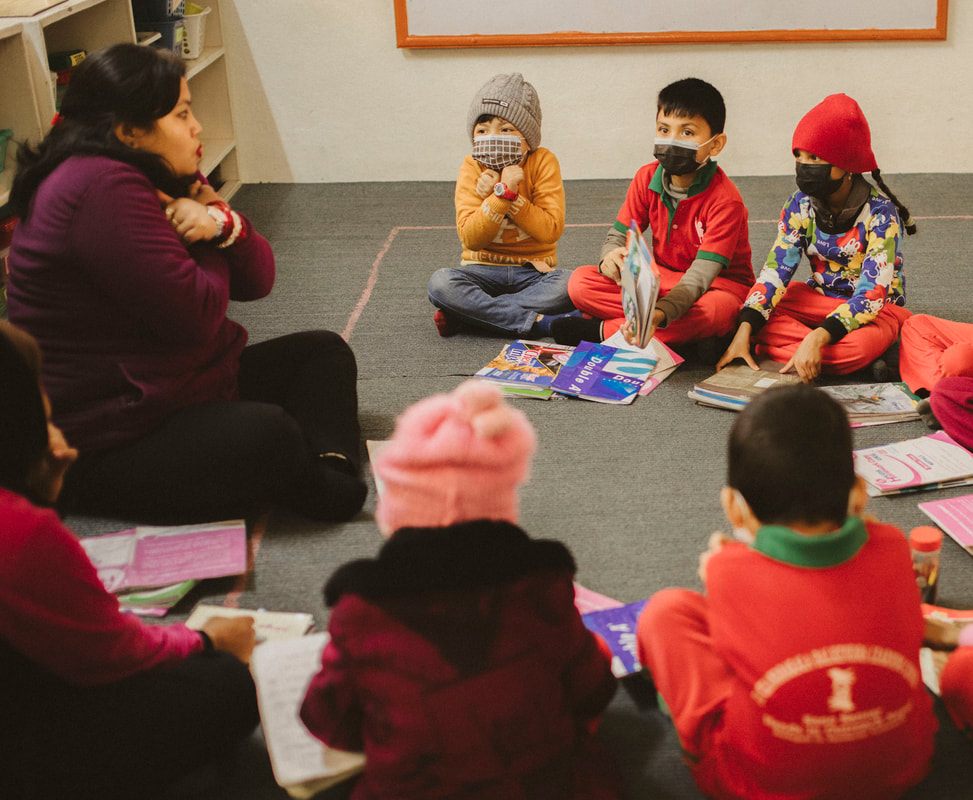 HIO children bundle up as best as their families can afford, often wearing knit hats if they have them. Our community will be so grateful for the knit hats we’ll be bringing to Nepal in November. Dear Friends…hoping you all are well. At an elevation of 4,500 feet above sea level, it rarely snows in Kathmandu. But winters are chilly, especially in the morning and evening hours. Most HIO families have no central heat in their rented rooms. Our two early learning centers are unheated. A group of knitters is on a tear in Sheffield, MA, Ricky’s hometown in the Berkshires. They’re trying to knit 100 hats, enough for every child in our two learning centers to have one. If you’re a knitter, please consider joining them! The children we’re knitting for are between the ages of four to eight. You can use any pattern you like, and whatever yarn you have on hand, wool or acrylic. If you have an extra warm hat or two, feel free to send those along too, whether wool or fleece. We’ll stuff all of the hats into our bags and transport them to Nepal when we travel there in November. Extras will go to our older HIO girls as needed. Learning in winter will be so much nicer when our students are warmed by your kindness. With deep gratitude — Ricky and Laura Please send hats that are finished by October 31 to: Laura Hunt 38 Abner Potter’s Way South Dartmouth, MA 02748 Send hats that are finished by November 20th to: Ricky Bernstein 1504 Silver Street Sheffield, MA 01257 A warm head makes all the difference for learning more comfortably.
|






